 Petzlover
Petzlover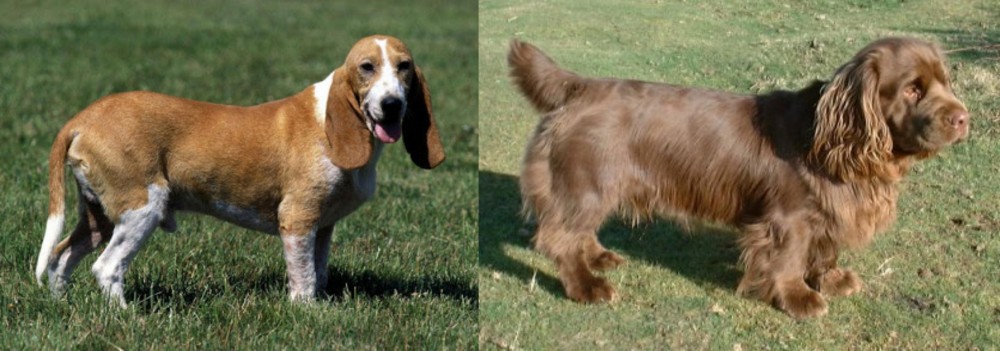 Schweizer Niederlaufhund is originated from Switzerland but Sussex Spaniel is originated from United Kingdom. Both Schweizer Niederlaufhund and Sussex Spaniel are having almost same height. Both Schweizer Niederlaufhund and Sussex Spaniel are having almost same weight. Both Schweizer Niederlaufhund and Sussex Spaniel has almost same life span. Both Schweizer Niederlaufhund and Sussex Spaniel has almost same litter size. Schweizer Niederlaufhund requires Low Maintenance. But Sussex Spaniel requires Moderate Maintenance
Schweizer Niederlaufhund is originated from Switzerland but Sussex Spaniel is originated from United Kingdom. Both Schweizer Niederlaufhund and Sussex Spaniel are having almost same height. Both Schweizer Niederlaufhund and Sussex Spaniel are having almost same weight. Both Schweizer Niederlaufhund and Sussex Spaniel has almost same life span. Both Schweizer Niederlaufhund and Sussex Spaniel has almost same litter size. Schweizer Niederlaufhund requires Low Maintenance. But Sussex Spaniel requires Moderate Maintenance
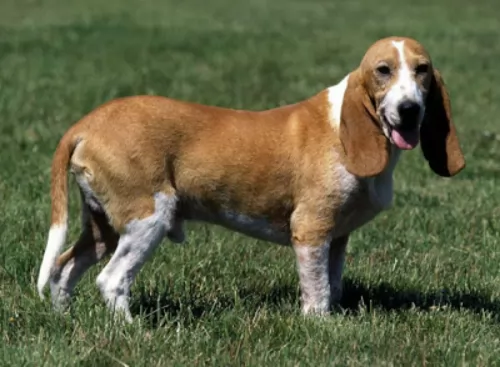 Originating in Switzerland, the Schweizer Niederlaufhund was established around 1900, when hunting became restricted to districts. The Swiss hunter needed a slower dog for the limited territory they could hunt in. Crossing selected Schweizer Laufhunds with Basset Hounds and other selected smaller, short legged hounds developed the Schweizer Niederlaufhund. By 1905 there was already a Schweizer Niederlaufhund Club.
Originating in Switzerland, the Schweizer Niederlaufhund was established around 1900, when hunting became restricted to districts. The Swiss hunter needed a slower dog for the limited territory they could hunt in. Crossing selected Schweizer Laufhunds with Basset Hounds and other selected smaller, short legged hounds developed the Schweizer Niederlaufhund. By 1905 there was already a Schweizer Niederlaufhund Club.
The Niederlaufhund became one of the best hunting dogs in the world, with its powerful body and ability to outhunt the Laufhund in tracking big game. Slower of course than the Laufhund it has a great sense of smell and an ability to easily find wounded animals. There are a few varieties, just like with the Swiss Hound again mostly because of their coloring. The Luzerner Niederlaufhund, the Jura Neiderlaufhund, and the Schwyzerlaufhund. They have musical voices that they use to communicate with the hunters and each other as well as that amazing sense of smell. They can hunt for hours without tiring and without much information from the hunter.
They are a cross breed not recognized by the larger kennel club such as the AKC and the UKC. They are recognized by the Dog Registry of America, Inc. (DRA), the American Canine Association Inc. (ACA) and most importantly by the Federation Cynologique Internationale (FCI). This last one is important because it could lead to recognition as a new breed by the UKC and the AKC.
 The Sussex Spaniel comes from Sussex in southern England. The whole purpose of his development was for him to rush between reeds, causing birds to fly up and for their owners to then shoot them so that they could retrieve them.
The Sussex Spaniel comes from Sussex in southern England. The whole purpose of his development was for him to rush between reeds, causing birds to fly up and for their owners to then shoot them so that they could retrieve them.
His history dates back to the 19th century when breeding for the dog started. The first breed standard was also written during this time.
It was about in 1969 that some of these Sussex Spaniels were imported to the United States where they were referred to as a sporting breed. Today they are still a rare breed.
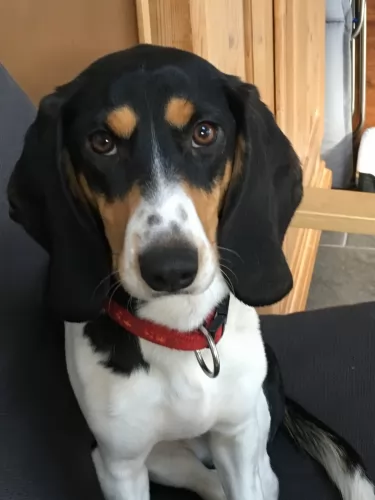 The Schweizer Niederlaufhund is a medium size, short dog. They look like their cousins, the Schweizer Laufhund but smaller. Their body is just slightly longer than it is tall, so you are left with the impression of a mostly square dog. The Niederlaufhund is well put together, with strong legs, a noble head, long droopy ears, broad chest, and a low held tail.
The Schweizer Niederlaufhund is a medium size, short dog. They look like their cousins, the Schweizer Laufhund but smaller. Their body is just slightly longer than it is tall, so you are left with the impression of a mostly square dog. The Niederlaufhund is well put together, with strong legs, a noble head, long droopy ears, broad chest, and a low held tail.
The Small Lucerne Hound has a white cote with smooth speckles of black or gray making them appear to be blue.
The Small Bernese Hound has a tricolor coat of white, tan and black. There are tan marks on the eyebrows. There is a wire haired Small Bernese as well. He has a short beard.
The Small Schwyz Hound is smooth coated in white with orange or yellow-red patches. The wired haired version is extinct.
The Small Jura Hound is a single coated dog with a black coat and tan marking above his eyes as eyebrows as well. He might have some white as well.
 With his low, long body and short legs, this beautiful golden liver color spaniel has long, silky ears and a long, feathery tail.
With his low, long body and short legs, this beautiful golden liver color spaniel has long, silky ears and a long, feathery tail.
He is a moderate shedder. He is quite a distinctive looking dog with his silky coat and sombre expression. You’d descibe him as medium sized dog, standing at between 33 – 38cm in height and weighing 16 -20kg.
The Sussex Spaniel is more slow and sedate than the Cocker Spaniel but he still makes an excellent pet and companion.
He is strong and robust. He is clever too, but slightly stubborn, while also being clownish and entertaining. They’re the kind of dogs who bond strongly with their family and aren’t that enthusiastic with strangers.
They take a while to warm towards people they don’t know. He is steady, reliable and determined and makes a good watchdog. Because he is gentle and even tempered he makes an ideal pet for children and he is able to get on well with other dogs too.
It’s good to have them trained and socialized as they become even more amicable around other people and dogs they don’t know.
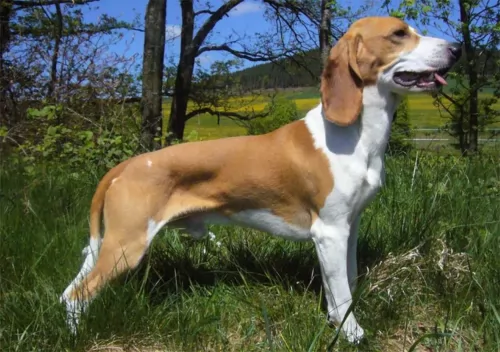 Children friendliness – yes, they are but use caution around small children and small prey.
Children friendliness – yes, they are but use caution around small children and small prey.
3. Adaptability - needs room to run and explore – is very frustrated when confined.
 He is a low drooling dog and he adapts easily to life with his human family, preferably in the countryside.
He is a low drooling dog and he adapts easily to life with his human family, preferably in the countryside.
He isn’t the most intelligent breed, but most people love him just like that because he’s eager to please and just wants to be your trusted, loyal pet and companion.
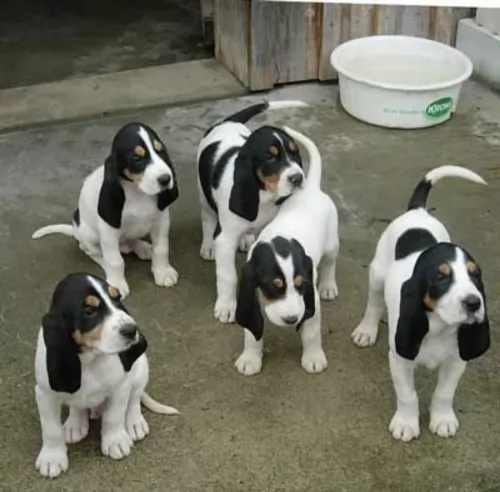 The Niederlaufhund Is prone to a very medical issues to keep an eye on. They include:
The Niederlaufhund Is prone to a very medical issues to keep an eye on. They include:
• Hip Dysplasia – This comes from hip joints that are not well formed and cause reduced mobility and pain. Parents can be tested before the dogs are bred to make sure their hips are good, and that dysplasia will not be passed to puppies. This dysplasia can cause arthritis and even lameness.
• Ear Infections – With long drooping ears it is easy for the dog to acquire ear infections. This is even more so for a hunting dog like the Niederlafhund. It is important to clean the dog’s ears on a regular basis.
 Your Sussex, like any other dog, is going to be prone to some diseases and conditions. If you are going for a puppy, always look for a reputable dog breeder, as this at least gives your dog a better chance of a healthy life.
Your Sussex, like any other dog, is going to be prone to some diseases and conditions. If you are going for a puppy, always look for a reputable dog breeder, as this at least gives your dog a better chance of a healthy life.
This is a congenital heart disease where blood doesn't flow properly and where the right side of the heart works harder and actually enlarges.
If the obstruction is severe, it can cause arrhythmia or congestive heart failure.
If the stenosis is mild, you may not even notice any conditions, but if it's severe, your pet may have difficulty with breathing, his stomach may be distended, and with strenuous exercise he could even collapse.
This is when a disc in the spine ruptures and pushes upward into the spinal cord. It can be an injury or an inherited condition.It is painful and will include anti-inflammatory medications and possibly surgery.
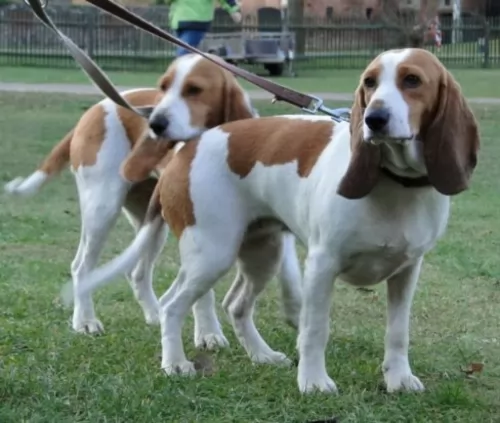 1Feeding the puppy - give 1 cup per day of high quality dog food divided into 3 meals.
1Feeding the puppy - give 1 cup per day of high quality dog food divided into 3 meals.
2.Feeding the adult – give one and one half cups of high quality dog food divided into 2 meals.
4. Games and Exercises – needs a lot of daily exercise and loves field trials, running and activities like barn hunt.
 Because of the long, silky hair, brushing your Sussex twice a week will be necessary to prevent matting from dirt adhering to the fur.
Because of the long, silky hair, brushing your Sussex twice a week will be necessary to prevent matting from dirt adhering to the fur.
The insides of those long floppy ears can be a breeding spot for bacteria as they don’t easily dry. When you brush him, check inside the ears to make sure they aren't red which could be a sign of ear infection.
Remember, if you don’t like to do all the grooming chores there are, a grooming parlour will do the chores for you. They cut your dog’s hair, check inside his ears, clean his teeth and trim his nails.
Every dog needs excellent food to be healthy. Many people feed their pets the wrong kinds of foods and then wonder why they have to fork up so much on vets fees.
If you feed your Sussex Spaniel one of the commercial manufactured foods, make sure its one of the good ones packed with vitamins and minerals. Tasty home-made food added to his kibble a couple of times a week can do him the world of good if its kept simple – no spicey, exotic foods that can upset the stomach.
Boiled chicken, brown rice or pasta and spinach, sweet potatoes and carrots all chopped up and mixed into the dry kibble once or twice a week will ensure a healthy, happy pet.
To avoid skin allergies and a dull coat, try and add in some raw meat occasionally. Always make sure he has access to fresh, cool water.
These dogs have been accustomed to a life of running in open spaces and they’re going to want lots of exercise. They love ball games and they love a walk in the countryside with lots of new scents to follow.
It’s why this dog isn’t suited to life in a small city property. He needs space and the outdoors to use up his energy.